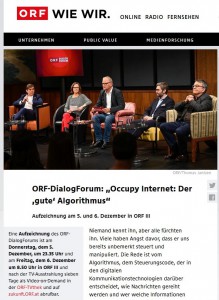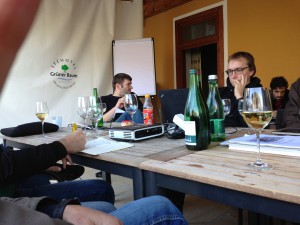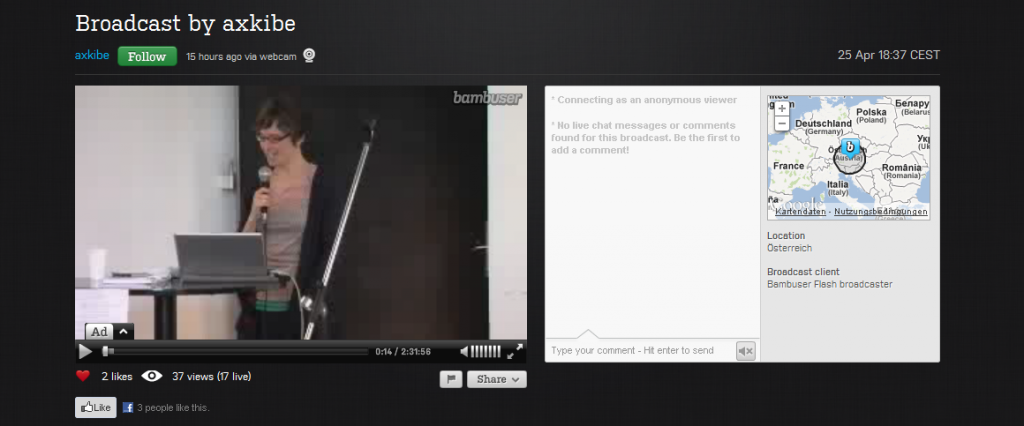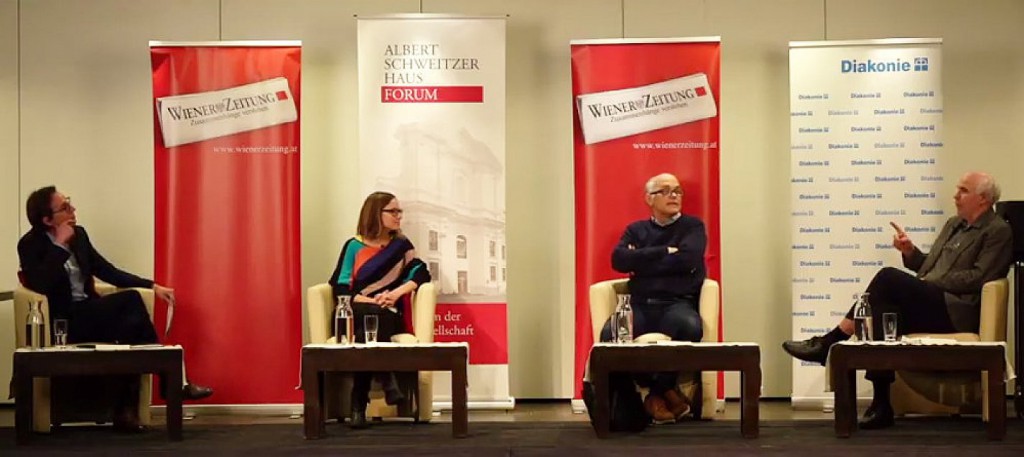Two panel discussions might be worth mentioning: 1) I participated in this year’s Joint Academy Day of the Austrian Academy of Sciences (organized together with the Canadian Academy of Sciences). Our panel was concerned with the Covid-19 crisis and its social, economic, and policy implications. The video can be watched here. 2) The Austrian newspaper “Wiener Zeitung” organized a panel discussion on the topic of “Algorithms – friend or enemy?”; the link to the video can be found here.
Tag Archives: algorithm
AMS-algorithm_final report out! yay!
Finally, our report of the project on the so-called AMS-algorithm is out!!! YAY!!! It was a lot of work, but it was definitely worth it! It is an in-depth sociotechnical analysis and deconstruction of the algorithm the Austrian public employment service (AMS) is planning to roll out all over Austria starting from January 2021. The algorithm poses several severe challenges on both the institutional level and the larger societal level, as we – Doris Allhutter, Florian Cech, Fabian Fischer and Gabriel Grill – argued in our report. We’d like to thank the Upper Austrian Chamber of Labor (AK OÖ) that financed our study and particularly Dennis Tamesberger for his support throught the process. Here you can download the full report.
 The report triggered lots of media coverage, e.g. in APA Science or at orf.at. We also did some interviews, e.g. for the Austrian Academy of Sciences, Futurezone or the radio broadcast Ö1 (all in German). The final report is in German, but english publications will (hopefully) follow SOON! For now I’d like to point you to the english publications in New Frontiers in Big Data that we published a year ago (only based on publicly available materials back then, but still relevant in its argumentation):
The report triggered lots of media coverage, e.g. in APA Science or at orf.at. We also did some interviews, e.g. for the Austrian Academy of Sciences, Futurezone or the radio broadcast Ö1 (all in German). The final report is in German, but english publications will (hopefully) follow SOON! For now I’d like to point you to the english publications in New Frontiers in Big Data that we published a year ago (only based on publicly available materials back then, but still relevant in its argumentation):
Allhutter, D., Cech, F., Fischer, F., Grill, G. & Mager, A. (2020) “Algorithmic Profiling of Job Seekers in Austria: How Austerity Politics Are Made Effective”, Frontiers in Big Data (Special Issue Critical Data and Algorithm Studies), full text; open access here.
algorithmic profiling
 I’m very happy that our article “Algorithmic Profiling of Job Seekers in Austria: How Austerity Politics Are Made Effective” by Doris Allhutter, Florian Cech, Fabian Fischer, Gabriel Grill and me (from the ITA, TU Wien, University of Michigan) is published now!! 🙂 It’s part of the special issue “Critical Data and Algorithm Studies” in the open access journal Frontiers in Big Data edited by Katja Mayer and Jürgen Pfeffer! Thanks Katja for a speedy review process!! Surprisingly, the article triggered quite some resonance within the academic, but also in the public sphere. Lot’s of journalists etc got interested in this “first scientific study” on “the AMS Algorithm”. Since we’re currently working on an additional study comprising a deeper analysis of our own materials (including our own data inquiry to the AMS), we’re not able to talk much about this paper in public at this specific moment. But new insights will follow by the end of Mai or mid-June at the latest, so keep posted!!! Here’s the project description of the current study funded by the Arbeiterkammer OÖ.
I’m very happy that our article “Algorithmic Profiling of Job Seekers in Austria: How Austerity Politics Are Made Effective” by Doris Allhutter, Florian Cech, Fabian Fischer, Gabriel Grill and me (from the ITA, TU Wien, University of Michigan) is published now!! 🙂 It’s part of the special issue “Critical Data and Algorithm Studies” in the open access journal Frontiers in Big Data edited by Katja Mayer and Jürgen Pfeffer! Thanks Katja for a speedy review process!! Surprisingly, the article triggered quite some resonance within the academic, but also in the public sphere. Lot’s of journalists etc got interested in this “first scientific study” on “the AMS Algorithm”. Since we’re currently working on an additional study comprising a deeper analysis of our own materials (including our own data inquiry to the AMS), we’re not able to talk much about this paper in public at this specific moment. But new insights will follow by the end of Mai or mid-June at the latest, so keep posted!!! Here’s the project description of the current study funded by the Arbeiterkammer OÖ.
media coverage
 Last year, my work has been covered by various media outlets and events. First, the Austrian Academy of Sciences (ÖAW) made a portrait/ interview with me on the way visions and values shape search engines as part of their series “Forschen für Europa”. This piece included a fancy foto shooting, as you can see here. Second, I was invited to take part in the panel discussion of the ORF Public Value event “Occupy Internet. Der gute Algorithmus” (together with Tom Lohninger from epicenter.works, Matthias Kettemann from the Hans-Bredow-Institut and Franz Manola from the ORF Plattformmanagement). The live discussion took place at the “Radiokulturhaus” and was aired in ORF 3 thereafter. Here you can find the abstract, the press release and the video in case you want to watch the whole discussion. Finally, I was invited as a studio guest to the radio broadcast “Punkt 1” at Ö1 “Das eingefärbte Fenster zur Welt“, where I spoke about alternative search engines and people could phone in and ask questions per email. Talk radio it is! 😉 – all in German.
Last year, my work has been covered by various media outlets and events. First, the Austrian Academy of Sciences (ÖAW) made a portrait/ interview with me on the way visions and values shape search engines as part of their series “Forschen für Europa”. This piece included a fancy foto shooting, as you can see here. Second, I was invited to take part in the panel discussion of the ORF Public Value event “Occupy Internet. Der gute Algorithmus” (together with Tom Lohninger from epicenter.works, Matthias Kettemann from the Hans-Bredow-Institut and Franz Manola from the ORF Plattformmanagement). The live discussion took place at the “Radiokulturhaus” and was aired in ORF 3 thereafter. Here you can find the abstract, the press release and the video in case you want to watch the whole discussion. Finally, I was invited as a studio guest to the radio broadcast “Punkt 1” at Ö1 “Das eingefärbte Fenster zur Welt“, where I spoke about alternative search engines and people could phone in and ask questions per email. Talk radio it is! 😉 – all in German.
die macht der algorithmen
Radiosendung zum Thema “Die Macht der Algorithmen”. Mit vielem lieben Dank an Herbert Gnauer!! Radio Dispositiv zu hören auf Orange 94.0 @HerbertGnauer
algorithmic imaginaries & algorithmic regimes
 My new research project “Algorithmic Imaginaries. Visions & values in the shaping of search engines” is online (on the ITA Website)! 🙂 Thanks to Thomas Bayer for his help!
My new research project “Algorithmic Imaginaries. Visions & values in the shaping of search engines” is online (on the ITA Website)! 🙂 Thanks to Thomas Bayer for his help!
 Further, the short videos on “Algorithmic Regimes” by Felix Stalder & Konrad Becker (World-Information Institute) are online too! The project is called Painted by Numbers, which is a great name I think! All videos are focusing on algorithmic logics and culture/ politics/ regulation etc. It’s really a great compilation of people and statements on algorithmic power in contemporary society. The videos will be assembled as video installations in art exhibitions. You can watch all of them here.
Further, the short videos on “Algorithmic Regimes” by Felix Stalder & Konrad Becker (World-Information Institute) are online too! The project is called Painted by Numbers, which is a great name I think! All videos are focusing on algorithmic logics and culture/ politics/ regulation etc. It’s really a great compilation of people and statements on algorithmic power in contemporary society. The videos will be assembled as video installations in art exhibitions. You can watch all of them here.
momentum13. technology & regulation
Last week I had the pleasure to take part in the Momentum13 symposium. Momentum is a conference series that aims at bridging the gap between the sciences and politics. Initiated by the EU politician Josef Weidenholzer and Barbara Blaha its main purpose is to integrate critical research, leftwing politics and practical experience to think about issues such as “progress”, the motto of this year’s conference. The 3-day event was organized in tracks focussing on various topics including gender equality, social movements, arts & culture, the future of work and politics, and technology & regulation – the track I moderated together with fukami; partly on a huge terrace by the lake with a decent glass of wine.. thanks for that! 🙂
 In our track we had heated debates on small technical details such as internet ports and exploit regulations and big societal questions relating to privacy, democracy and the future of the internet. But these two aspects, of course, closely relate to one another. Seemingly small technical decisions on the legitimacy or illegitimacy of a particular piece of code have largescale political consequences in terms of IT security and the stability of infrastructure we’re using day by day. And vice versa, broad societal developments and power relations influence the construction of information technology and the way the internet looks today. In a capitalist age for-profit companies like Google, for example, figure as central driving force in terms of technology development. The integration of more and more services in the web browser, for example, results in a black-boxing of technology. The less you understand your tools, the more dependent you are on their creators. Or, as fukami put it: “If you can’t break it, you don’t own it”.
In our track we had heated debates on small technical details such as internet ports and exploit regulations and big societal questions relating to privacy, democracy and the future of the internet. But these two aspects, of course, closely relate to one another. Seemingly small technical decisions on the legitimacy or illegitimacy of a particular piece of code have largescale political consequences in terms of IT security and the stability of infrastructure we’re using day by day. And vice versa, broad societal developments and power relations influence the construction of information technology and the way the internet looks today. In a capitalist age for-profit companies like Google, for example, figure as central driving force in terms of technology development. The integration of more and more services in the web browser, for example, results in a black-boxing of technology. The less you understand your tools, the more dependent you are on their creators. Or, as fukami put it: “If you can’t break it, you don’t own it”.
This, however, causes a couple of questions: Do we all need to learn programming to use the computer? (or how else would we be able to “break it”?) Or isn’t it the role of politics and law to set limits where limits are needed (e.g. data protection and the exploitation of user data by big US-American companies) and to protect us from harmful technology? Or is that an illusion in post 9/11 societies where extensive surveillance has become a central interest not only of companies, but also of nation states around the globe? And what can we do about all that? How can we regulate Google, Facebook, Twitter and other tech companies that increasingly shape our information universe, social relations, and political discourses, as we’ve seen in our track in presentations on Twitter politics and data journalism? What role can technology funding play in regard to the steering of information technology? How can we make legal practices more transparent or measure – and promote – open data strategies; or “open everything”? What kind of copyright is feasible in times of file-sharing platforms and how can data protection be secured in companies aiming at full-scale observation of employees? How can we manage risks? Those types of questions were discussed in our track. However, those are also the types of questions that future decision-making processes in the field of technology and society will be concerned with. Negotiations of the new EU data protection law, for example, will serve as an interesting test case for future technology development and socio-political agendas. How this negotiation process will end remains to be seen. That both lobbying on parts of internet businesses and the NSA scandal will be crucially influencing the reform process seems to be clear by now. Or, to cite fukami again, “we should thank Snowden” since his leaks have not only shaken up civil society, but EU policymakers too (hopefully!).
Our track discussions were accompanied by good food and great evening events, such as the keynote by Robert Pfaller or the book-reading by Kathrin Passig. Unfortunately, I missed the huge party that took place Saturday night and the Sunday evening matinee. But I’m sure that was fun too! Next year’s conference will be focused on “emancipation”. I highly recommend going there! (and not only because of the scenic location). More information can be found on the Momentum website (including info on the journals Momentum Quarterly and Momentum Policy Paper).
“Black Box Suchmaschine” Video Archive
Yesterday we had a great event at the Museumsquartier in Vienna: our “Themenabend Black Box Suchmaschine” (see program below). For those who missed the event and can’t wait to watch it online (or parts of it 😉 ) we archived the video stream here:
 Thanks to Axel Kittenberger for the technical support & the stream! & everyone, who participated and made this evening a great contribution to the politics of search, modes of ordering knowledge, privacy and regulation (which triggered a heated debate, as you can see towards the end of the video)..
Thanks to Axel Kittenberger for the technical support & the stream! & everyone, who participated and made this evening a great contribution to the politics of search, modes of ordering knowledge, privacy and regulation (which triggered a heated debate, as you can see towards the end of the video)..
Finally, René König presented the newly formed network Re:Search – a mailinglist established in co-operation with the Institute of Network Cultures, Amsterdam (Geert Lovink). Subscribing to the list is only the first step, further activities will follow – Blog posts on the Society of the Query Blog, events, a publication hopefully! So stay tuned 😉
Themenabend: Black Box Suchmaschine, 25.4.2012, 18.30, MQ/ Raum D
I’m already looking forward to the event “Black Box Suchmaschine. Google & co. im gesellschaftspolitischen Kontext” I’m organizing together with René König (in cooperation with our research group Internet Research).
Here’s the abstract & the program featuring great speakers!!! (in German)
Termin: 25.04.2012, 18.30
Ort: Museumsquartier Wien, Raum D
Zudem Online-Anbindung durch Streaming und/oder Microblogging.
(Image credit: Anja Goller. Something interesting..)
Suchmaschinen wie Google prägen das Netz wie kaum ein anderer Dienst. Zwar gewinnen soziale Netzwerkseiten wie Facebook zunehmend an Bedeutung, doch werden Nutzungsstatistiken noch immer von Suchmaschinen dominiert. „Googeln“ ist eine alltägliche Praxis geworden, die nur selten hinterfragt wird. Dabei strukturieren Suchmaschinen unseren Zugang zu Netzinformationen maßgeblich. In der Privatwirtschaft ist diese Erkenntnis längst etabliert und Firmen geben viel Geld für sogenannte Suchmaschinenoptimierung aus. Aus gutem Grund, denn bisherige Nutzungsforschung zeigt deutlich, dass mehrheitlich den hierarchischen Ordnungen der Ergebnislisten gefolgt wird. Gleichzeitig wird dabei häufig eine fragwürdige Datenpolitik betrieben, die immer wieder für Kontroversen sorgt. Erst kürzlich hat sich etwa Google mit seinen geänderten Nutzungsbedingungen wieder ins Zentrum des öffentlichen Interesses katapultiert. Denn seit März müssen angemeldete NutzerInnen zustimmen, dass das Unternehmen umfangreiche User-Daten aus seinen verschiedenen Diensten (dazu gehört nicht nur Google Web Search sondern auch beispielsweise Google Maps, Google Mail, YouTube, Google+ uvm.) zusammenführt, was DatenschützerInnen auf die Barrikaden steigen lässt. Entsprechend kommt Suchmaschinen wie Google eine erhebliche gesellschaftspolitische Bedeutung zu, mit der sich unser Themenabend „Black Box Suchmaschine“ aus unterschiedlichen Blickwinkeln auseinander setzen möchte. Dazu geben WissenschaftlerInnen Einblicke in aktuelle Forschungen, die wir zur Diskussion stellen wollen. Schließlich wird im Anschluss das Netzwerk „[Re]Search“ gegründet, an dem sich alle Interessierten beteiligen können.
Programm
18.30 Begrüßung
18.35 Keynote:
Asymmetrische Beziehungen – Klassifizierungskämpfe in Informationsgesellschaften
Konrad Becker
Institut für neue Kulturtechnologien & World-Information.Org (Wien)
18.50-19.30 Block 1: Wie Suchmaschinen unser Wissen gestalten
Ganz persönlich? Alte und neue Soziometriken der Suchmaschinen
Katja Mayer
Universität Wien, Wissenschaftsforschung
Das suchende Individuum – Subjektive Perspektiven zwischen globalen Strukturen und Personalisierung
René König
Karlsruher Institut für Technologie
Vertrauen, Diversität und Empfehlungssoftware
Judith Simon
Universität Wien / Karlsruher Institut für Technologie
19.30-20.10 Block 2: Wie Google & co. mit unseren Daten Geld verdienen
Suche und Werbung: Fundamentale Interessenkonflikte im Google-Empire
Bernhard Rieder
Universität Amsterdam
Suchmaschinen im Spannungsfeld von globaler Informationsökonomie und lokaler Gesellschaftspolitik
Astrid Mager
Österreichische Akademie der Wissenschaften
Auf der (Web-)Suche nach der informationellen Selbstbestimmung – Privacy by Design als Regulierungsansatz?
Jaro Sterbik-Lamina, Stefan Strauß
Österreichische Akademie der Wissenschaften
20.10 Podiumsdiskussion
Moderierte Podiumsdiskussion mit Publikumseinbindung (auch online) zu quer liegenden Fragen der präsentierten Themenschwerpunkte. Anschließend Gründung des Netzwerks [Re]Search für alle Interessierten.


